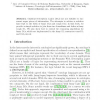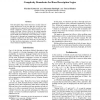1071 search results - page 73 / 215 » Modal Logics, Description Logics and Arithmetic Reasoning |
DALT
2009
Springer
15 years 2 months ago
2009
Springer
We continue the work initiated in [1–3], where the acceptance logic, a modal logic for modelling individual and collective acceptances was introduced. This logic is aimed at capt...
ECSQARU
2009
Springer
15 years 4 months ago
2009
Springer
Abstract. Classical Description Logics (DLs) are not suitable to represent vague pieces of information. The attempts to achieve a solution have lead to the birth of fuzzy DLs and r...
102
click to vote
DLOG
2011
14 years 1 months ago
2011
We propose an extension of SROIQ with nominal schemas which can be used like “variable nominal concepts” within axioms. This feature allows us to express arbitrary DL-safe rule...
DLOG
2010
14 years 7 months ago
2010
Sophisticated uncertainty representation and reasoning are necessary for the alignment and integration of Web data from different sources. For this purpose the extension of the Des...
AAAI
2007
15 years 4 days ago
2007
Horn description logics (Horn-DLs) have recently started to attract attention due to the fact that their (worst-case) data complexities are in general lower than their overall (i....


